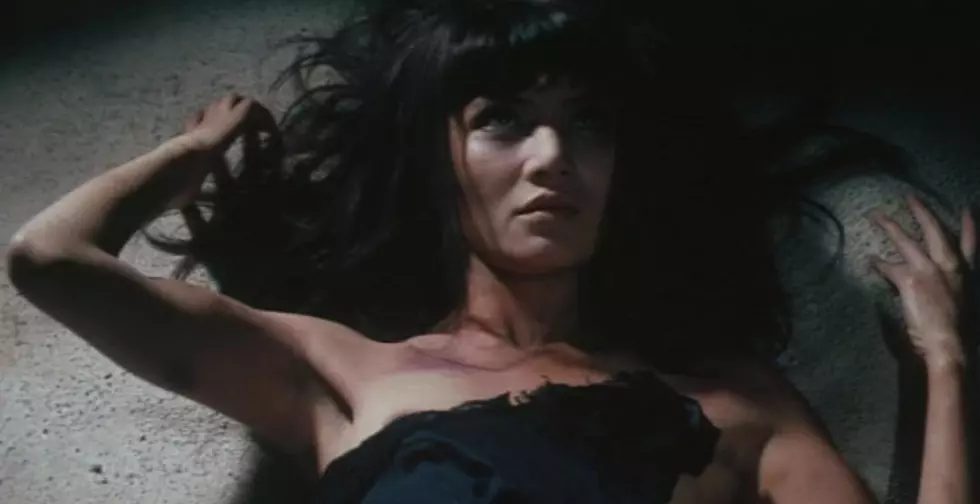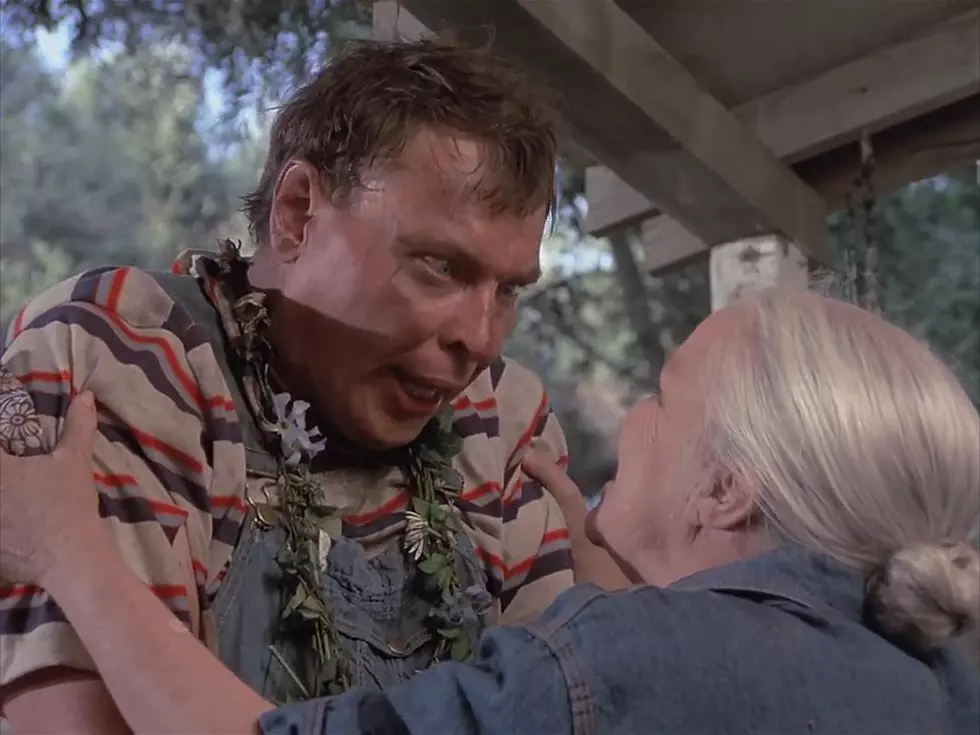
Horror Biz: Indulge in ‘Rosemary’s’ Knockoff ‘The Sentinel’
Well, Halloween is here. For this last installment of Horror Biz, I’ve decided to take the opportunity to run my mouth a little bit about a divisive fright flick that you will either love or hate or really, really hate.
My name is Michael Berdan. I’ve been kicking around the underground for a minute or two as a musician and a freelance journalist, where my writing concentrates largely on the intersection of music and genre cinema. Currently, I play in the punk and industrial projects Uniform and York Factory Complaint. Horror is life, and life is abject horror.
THE SENTINEL (dir. Michael Winner, 1977)
The late '70s made for a strange time in American cinema. Years of conflict and distrust had given way to a pervasive, almost tangible nihilism. This was a decade removed from the Summer of Love; a decade of war and Watergate and social uncertainty and economic upheaval. Given the landscape, it made a degree of sense that that movies of the era would become reflective in an effort to give the climate voice. This period of the New Hollywood movement is notable for its often paranoid political leanings (Marathon Man, The Parallax View), insights to middle class despondency (The Deer Hunter, Blue Collar), wariness towards the mechanics of mass media (Network, Punishment Park), and Judeo-Christian fables of faith in crisis (The Exorcist, Rosemary’s Baby).
The Sentinel falls comfortably into the latter world of Catholic meltdown cinema. In Michael Winner’s follow-up to Death Wish, he lets all of his push-button, reactionary conservative flags fly. Casual sexism runs wild, people with physical deformities are branded as demons, mental health issues are used as exploitative plot devices and the only way for the day to be won is to repent for your sins by giving yourself entirely to God. Sounds shitty and insensitive, right? By 2016 standards, it probably is, but man … I loved this thing growing up and still have a soft spot for it. In case you're interested, here’s a walk-through:
The film is based around the mental disintegration of high fashion model Allison Parker, played by Nightmares’ Christina Raines. Allison has suffered two suicide attempts. The first one happened after she walked in on her father having a three-way with two prostitutes and a cake. He slaps Allison around for the intrusion, after which she retreats to the bathroom and cuts her wrists. The second attempt happened when she swallowed a bottle of pills after the death of her lawyer boyfriend’s wife. When the movie begins, Allison is living with the lawyer, but trying to find her own place. She quickly stumbles across a listing for a stunning, fully furnished Brooklyn Heights apartment (for like $400 or some shit — seriously, the monthly rent on this thing today would cost as much as a Damien Hirst diamond-encrusted turd). When checking out the building, Allison notices a man starting at her from the open window of the top floor apartment. She’s told by her realtor that the top floor is occupied by a harmless blind priest who sits at that very spot all day, every day. Fair enough.
Allison moves in. Meets a colorful assortment of neighbors, the most outgoing of which is eccentric Charles Chazen (Burgess Meredith, in a role delightfully beneath him). When she introduces herself to her upstairs neighbors Gerde and Sandra (played respectively by Sylvia Miles and a young Beverly D’Angelo, of all people), Gerde excuses herself for a moment and Sandra takes the opportunity to masturbate in a chair across from Allison. Allison is visibly appalled, but attempts to politely look away. When Gerde comes back to the room, Allison asks her what they do for a living. Gerde replies, “We fondle each other.” Allison runs the fuck away.
Other shit happens. Allison begins to have fainting spells. She attends a party along with all of her neighbors for Chazen’s cat, Jezebel. When she hears weird stomping around upstairs at night, she complains to her realtor about it and learns that the building is totally vacant, save for herself and the blind priest on the top floor. In a particularly gruesome scene, Allison encounters the ghost of her dead father in one of the vacant apartments, who attempts to assault her. She manages to cut off his nose and runs screaming from the building. She winds up hospitalized.
At this point, we learn from a couple of cops (the sidekick played by a nearly silent Christopher Walken) that the lawyer boyfriend had been suspected in the murder of his wife, which, if you're paying attention, you’ll remember was the impetus for Allison’s second suicide attempt. The cops do some snooping about the Brooklyn Heights building and find out that all of the “neighbors” that Allison has been hanging out with are really the ghosts of long-dead criminals, except for the priest. Now for the meat of the story: It turns out that the top floor apartment is really a gate to Hell and the blind priest has been acting as a sentinel, vigilantly standing guard against the demons who are trying to cross over into our world. The priest is getting old, and Allison is unknowingly being groomed by the Catholic Church (who are the real landlords of the building) to take over his watch when he dies. Apparently, because of her two suicide attempts, she is a perfect candidate for the position and must take up the duty as an act of contrition. Word.
In the climactic finale, Chazen and a horde of demons (who, in typical classy Winner fashion, are largely played by people with visible physical disabilities and deformities) attempt to talk Allison into killing herself in the priest’s apartment, which would effectively open the gate to Hell. The blind priest bursts in the room with a comically large crucifix and sends all the demons away before Allison can cut her wrists. The movie ends in a renovated building at the same location. A young couple (boyfriend played by Tom Berenger) are checking out an apartment, and notice a figure sitting by an open window on the top floor. The realtor explains that the occupant of the unit is an old, blind nun who sits at that spot day in and day out.
So, yeah, this is a Rosemary’s Baby knockoff complete with all of the sensitivity of your average Trump rally. Critic Robin Wood somewhat famously called The Sentinel “the worst, most offensive and repressive horror film of the 1970s.” Personally, I’ve seen much worse, but I understand where Wood is coming from. The use of individuals with physical disabilities in the climax is almost the direct antithesis of Tod Browning’s Freaks. In Browning’s film, the characters are strong, capable and full of life. Winner uses the same type of individual and reduces them to, quite literally, threatening monsters at the gates of hell. The film is pretty shitty to women. It is pretty shitty to people with mental health issues, too. At the time of The Sentinel’s production, the church still held national sway. Where Rosemary’s Baby and The Exorcist use Catholic fear as a means of existential exploration, all The Sentinel does is demand theological contrition for the sin of feeling suicidal. Great.
All of this being said, I still enjoy The Sentinel and Winner’s body of work as a whole. He was a product of a different time, and I take his politics with a grain of salt. Homeboy didn’t take home a Nobel Prize for Death Wish 3 or The Mechanic, and I’m pretty sure he was okay with that. The Sentinel does offer some beautiful locations, some great gore and some genuinely well-crafted scares. Quite understandably, it is not for everyone, and that’s for the best. To think that this was made by Universal Pictures in an era where cashing in on Catholic fear was considered a sound investment is straight-up bonkers by today’s standards. The Sentinel is a relic that could not be created today, and that’s not exactly a bad thing.
More From CLRVYNT









